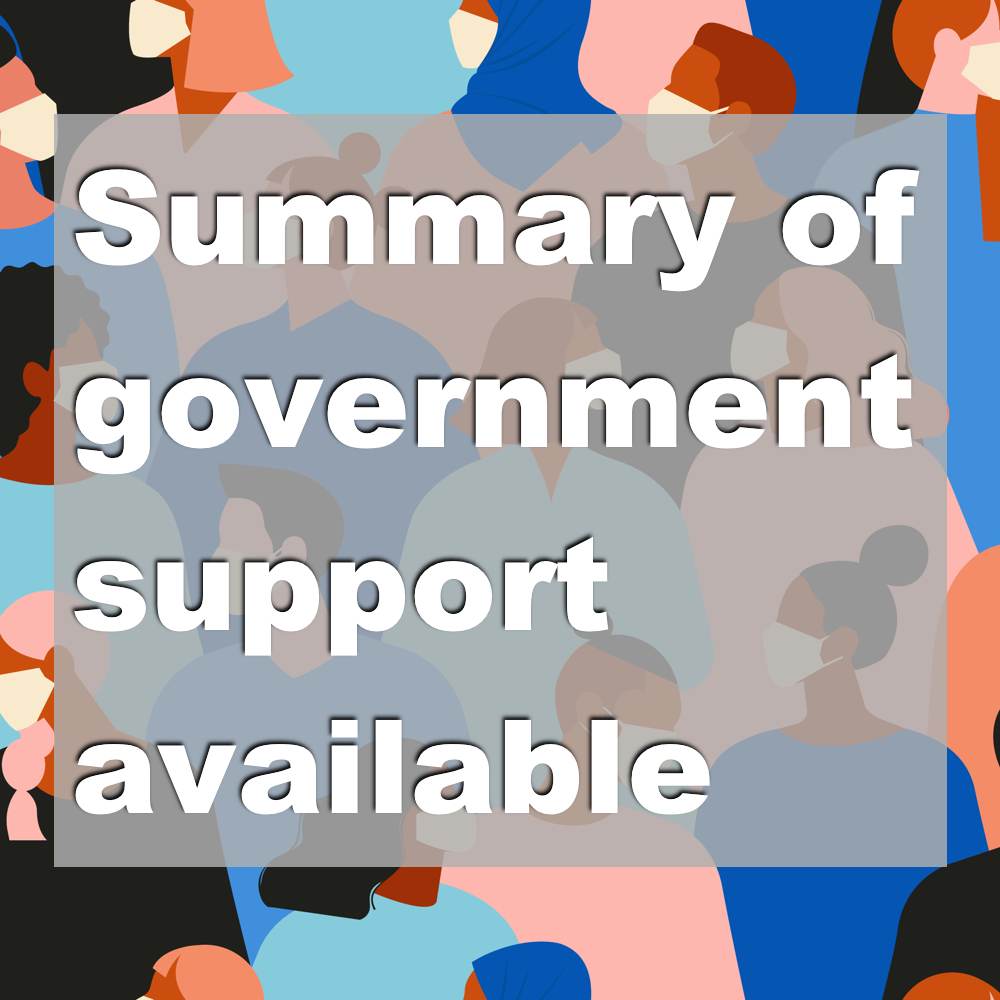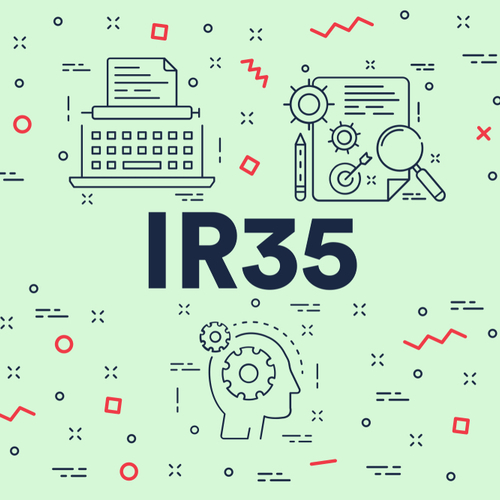Summary of government support available
 We highlight some guidance and advice the government has for employers and self-employed individuals.
We highlight some guidance and advice the government has for employers and self-employed individuals.
At TaxAgility, we continue with business as usual, although operating remotely until further notice. We are contactable by email at taxsupport@taxagility.com or on our landline 0208 780 2349.
The government has announced numerous measures in the past week and has now updated their guidance for employers and self-employed individuals. The following is a summary of some of the measures available.
Coronavirus Job Retention Scheme (furlough guidance)
This scheme is aimed to encourage employers to retain staff through these unprecedented times. Where employees are no longer required to perform work duties due to the coronavirus impact, the employer can make a claim for a grant from the government amounting to 80% of their furloughed wages and employer’s national insurance up to a maximum of £2,500 per employee per month.
These employees are termed furloughed. You must notify your staff that they are being furloughed formally in writing. HMRC are working as quickly as possible and anticipate to have the online portal ready by the end of April 2020 for claims to be made by the business.
The salary used to compute the funding for furloughed employees would be based on the February 2020 payslip.
As an illustration, if your gross salary was £719 in February 2020 you could receive funding of £575.20 for any months in which you were officially furloughed. At present, the measure is in place for three months but may be extended.
As a director of a limited company, you may be able to apply for the Coronavirus Job Retention Scheme if you are being paid a salary through a PAYE scheme. Directors can be furloughed in the same way as other employees. The furloughed employee must not undertake work for the company during this time.
Deferring VAT payments
HMRC are supporting businesses by offering to defer your VAT payments for 3 months if your VAT payment is due between 20 March 2020 and 30 June 2020. HMRC will not charge interest or penalties on any amount deferred as a result of the announcement. You will still need to submit your VAT returns to the HMRC on time. Refunds will be paid by the HMRC as normal.
If you choose to defer your VAT payment it will need to be paid up by 31 March 2021. You do not need to tell the HMRC you are deferring your payment.
It is your responsibility to cancel your VAT direct debit which you can do by contacting your bank or you can cancel the direct debit payment online which will prevent your VAT liability from being automatically paid when your VAT return is submitted.
VAT payments after the deferral payment will need to be paid as normal within the normal time frame which you will need to do manually as your direct debit will have been cancelled.
Deferring Income Tax payments
For Income Tax Self-Assessment, payments due on the 31 July 2020 may be optionally deferred until 31 January 2021. You do not need to be self-employed to be eligible for the deferment. This is an automatic offer with no applications required. No penalties or interest for late payment will be charged if you defer payment until January 2021.
HMRC Time to Pay Scheme
If you can’t pay any other taxes due to the impact of Coronavirus a payment plan can be negotiated through calling the HMRC Payment Support Service line on 0300 200 3835, open Monday to Friday, 8am to 4pm.
Self-employment Income Support Scheme
The Self-employment Support Scheme has been announced and expected to be made available in June 2020. HMRC will contact individuals who are eligible to apply for the scheme. You may only be eligible for this scheme if you’re self-employed or a member of a partnership and you have traded in the 2019-20 tax year and have lost trading/partnership trading profits due to Coronavirus.
You must have submitted your self-assessment tax return for the year ended 5 April 2019, if not this needs to be submitted by 23 April 2020. HMRC will use this data to determine eligibility for the scheme and they will invite you to the scheme if you qualify, you cannot apply for the scheme.
This scheme is only available to individuals who have a trading profit of less than £50,000. The grant will be 80% of the average trading profit from the last 3 tax years and it will be up to a maximum of £2,500 per month. The initial scheme is available for three months.
Please note the Self-employment Support Scheme is not available to directors of limited companies who draw a salary and dividend income. Directors who take a salary may be eligible for the Job Retention Scheme as mentioned above.
Statutory Sick Pay relief packages for SME businesses
SME businesses and employers can reclaim Statutory Sick Pay (SSP) paid for sickness absence due to Coronavirus. The refund will cover up to 2 weeks’ SSP per eligible employee who has been off work because of Coronavirus. It is available to businesses with less than 250 employees claiming SSP due to Coronavirus.
12 Month Business Rate holiday for retail, hospitality and leisure businesses
Properties that will benefit from the relief will be occupied properties that are wholly or mainly being used as shops, restaurants, cafes, drinking establishments, cinemas and live music venues for assembly and leisure and for hospitality, as hotels, guest & boarding premises or self-catering accommodation.
Cash Grants for retail, hospitality and leisure businesses
The Retail and Hospitality Grant Scheme provides businesses in the retail, hospitality and leisure sectors with a cash grant of up to £25,000 per property.
Businesses in these sectors with a property that has a rateable value of up to £15,000 may be eligible for a one-off grant of £10,000 to help meet their ongoing business costs.
Businesses in these sectors with a property that has a rateable value of between £15,000 and less than £51,000 may be eligible for a grant of £25,000.
Coronavirus Business Interruption Loan Scheme (CBILS)
This temporary Loan Scheme supports SMEs with access to loans, overdrafts, invoice finance and asset finance of up to £5 million and for up to 6 years.
The government will cover the first 12 months of interest payments and any lender-levied fees, so smaller businesses will benefit from no upfront costs and lower initial repayments. The loans will be guaranteed by the government up to 80%.
These loans are accessed through the bank used by your business. If you have an existing loan with monthly repayments, you may want to ask for a repayment holiday to help with cash flow.
As of 3 April 2020, the government has made several changes to the scheme. It is now applicable to businesses regardless if they have been refused a loan on commercial terms. It also aims to help larger firms (with revenues between £45m and £500m) by offering government-backed loans of up to £25m.
Scams
Please be aware of scams relating to any of the above. If someone texts, calls or emails claiming to be from HMRC, saying that you can claim financial help or are owed a tax refund, and asks you to click on a link or to give information such as your name, credit card or bank details, it is a scam.
More information can be found at this link:
If you have any questions, please get in touch.
Please keep safe.
TaxAgility Accountants
Disclaimer
The information contained in this newsletter is of a general nature and no assurance of accuracy can be given. It is not a substitute for specific professional advice in your own circumstances. No action should be taken without consulting the detailed legislation or seeking professional advice. Therefore, no responsibility for loss occasioned by any person acting or refraining from action as a consequence of the material can be accepted by the authors or the firm.
Helping small businesses during this COVID-19 pandemic

The UK government has announced measures to support companies affected by the Coronavirus COVID-19 pandemic, learn what the measures are and how you can get assistance.
Many countries in the world have announced drastic stimulus measures to keep companies afloat and help people stay employed. In the UK, the government has also announced a string of measures. Quite a few of these announcements are made in a hurry with an attempt to abate fear first, while the exact processes are being worked out. As a result, the announcements have caused confusion among business owners. In this article, we aim to discuss what we know so far.
Government to pay up to 80% of wages
Known as Coronavirus job retention scheme, this measure is applicable to all UK employers who would otherwise have to lay off their workers during this crisis. A few important points are:
- The government plans to have the grant available by the end of April, although the grant can be backdated to March.
- You (the employer) must first classify the affected employees as furloughed workers and inform your employees accordingly.
- Once the government portal is made available, you can submit the information of your furloughed employees and their wages.
- HMRC will then reimburse 80% of wages of these furloughed workers, up to a cap of £2,500 per month.
Coronavirus Business Interruption Loan Scheme
You probably have heard from small business owners who are worried that they have to shut their business down because they do not have enough short-term cash flow to keep it going. If you are in this situation, explore the temporary Coronavirus Business Interruption Loan Scheme first.
- There are 40 accredited lenders (including major banks) offering this scheme.
- You can access to loans, overdrafts, invoice finance and asset finance of up to £5 million and for up to 6 years.
- While you must repay the loans, the government will cover the first 12 months of interest payments and any lender-levied fees to help small businesses.
- To be eligible, you must be a UK-based business with a turnover of less than £45 million per year. Your business must also meet the other British Business Bank eligible criteria.
- To apply, talk to your bank now. Alternatively, talk to one of the accredited lenders available on the British Business Bank website.
Deferring VAT
This is an automatic offer with no applications required. If your business is VAT-registered, you can defer VAT from 20 March 2020 to 30 June 2020, meaning you do not need to make a VAT payment during this period. This is applicable to all UK businesses. Please note that it doesn’t mean you don’t have to pay VAT, you are simply delaying the payment.
Deferring Income Tax payments
This is an automatic offer with no applications required. If you are self-employed, your Income Tax Self-Assessment payments (originally due on 31 July 2020) will be deferred to 31 January 2021. No penalties for late payment will be charged during the deferral period.
Statutory Sick Pay relief
Applicable to UK-based small and medium-sized businesses (with fewer than 250 employees as of 28 February 2020), this relief covers up to 2 weeks’ Statutory Sick Pay (SSP) per eligible employee who has been off work because of COVID-19. How it works is that you (the employer) will have to reclaim expenditure for any employee who claimed SSP as a result of COVID-19. The process to which you can reclaim is still being developed.
Small business grand funding of £10,000 for all business in receipt of small business rate relief or rural rate relief
If you own a small business that pays little or no business rates, your local authority will provide a one-off grant of £10,000 to eligible businesses to help meet their ongoing business costs.
- Your business must already receive Small Business Rate Relief and/or Rural Rate Relief.
- Your local authority will write to you if you are eligible for this grant.
- This will only happen when your local authority has received the money from the government, which is likely to be after 1 April 2020.
A 12-month business rates holiday for all retail, hospitality, leisure businesses in England
If your business is in the retail, hospitality and/or leisure sector, your next council tax (April 2020) should automatically exclude the business rate charge and it should continue to the 2021 tax year. You can estimate the business rate charge you will no longer have to pay this year using the business rates calculator.
Grants for retail, hospitality and leisure businesses
If your business is in the retail, hospitality and/or leisure sector, you can get a cash grant.
- For businesses in these sectors with a property that has a rateable value of £15,000 and under, you can get a £10,000 cash grant.
- For businesses in these sectors with a property that has a rateable value between £15,000 and £51,000, you can get a £25,000 cash grant.
- Your local authority will write to you if you are eligible for this grant once they have received the money from the government. Any questions, contact your local authority accordingly.
Support for nurseries
Nurseries that pay business rates will be eligible for a business rate holiday, which your local authority will re-issue your bill to exclude the business rate charge. Nurseries that will benefit from the relief are:
- Occupied by providers on Ofsted’s Early Years Register
- Wholly or mainly used for the provision of the Early Years Foundation Stage
Time to Pay Scheme
If you have unpaid taxes and your business is struggling due to COVID-19, you can call HMRC on 0800 0159 559 to discuss a payment plan. Please note that HMRC will review each case independently. If you are worried about a future payment, please call HMRC nearer the time.
For more information, check out this gov.uk page. Alternatively, email us on taxsupport@taxagility.com if you are worried about VAT, bad debt, and the cash-flow in your business. We are London’s small business accountants and have helped countless entrepreneurs and small business owners to get their finances right. We can help you too.
This blog is a general summary. It should not replace professional advice tailored to your specific circumstance.
A message from our Managing Director
 In light of the current global health concern, our Managing Director has a message for customers.
In light of the current global health concern, our Managing Director has a message for customers.
As per government advice, our staff are working remotely, therefore, our office has temporarily closed. Our team will continue to work as normal and can be contacted via email or mobile phone. If you do not have their email address to hand or are a new client looking to use our services, please email us on taxsupport@taxagility.com.
Although we can’t offer face-to-face meetings at present, we are operating conference calls and therefore can proceed as normal be it at a distance. We are monitoring all post that comes into the office as normal and ensuring this is distributed and actioned accordingly.
Keeping up-to-date with COVID-19 information
We are monitoring all news and government guidance very closely to ensure that our team have the latest knowledge. Government information for the public about COVID-19 can be found here:
- https://www.gov.uk/guidance/coronavirus-covid-19-information-for-the-public
- https://111.nhs.uk/covid-19
For COVID-19 guidance and support for businesses and employees, please read the following pages:
- https://www.gov.uk/government/publications/guidance-to-employers-and-businesses-about-covid-19/covid-19-support-for-businesses
- https://www.gov.uk/government/publications/guidance-to-employers-and-businesses-about-covid-19/covid-19-guidance-for-employees
Many thanks for your understanding during this time.
Sincerely,
Donovan Crutchfield FCA BFP
This page was first published on 18 March 2020 and updated on 23 March 2020.
Actions you can take when your small business is in distress

Every good business owner should learn how to spot the early warning signs of distress and know how to turn things around.
In every business, there are moments of ups and downs. Even when you have a good week of strong sales, chances are, you may still keep a lookout for early signs of distress unconsciously. Having the ability to handle business crises and turn things around is an essential part of managing your small business effectively. In this article, our small business accountants look at some common signs of distress and discuss what you can do to turn things around.
Common signs of business distress
Business distress can stem from internal or external. Here are a few common internal signs of business distress:
- You don’t have enough cash to meet obligations
- Your clients don’t pay on time
- Your stocks aren’t selling
- You miss forecasts
- Your profit margin is shrinking
- Your customer base is shrinking
- Your suppliers don’t want to work with you due to unpaid invoices
- Your return of investment is making a loss
- Your staff turnover is high
Changes in the external environment can also affect your business and the distress can include but not limited to:
- Changes in government policies
- New threats from competitors
- Changes in consumer behaviour
- Saturated demand
- Weak economic conditions
Five short-term recovery measures that address a business crisis
When your small business experiences signs of distress, the first thing you should look at is how much cash you have, as well as if your cash flow forecast is accurate (or not). If your cash level is low and your cash flow forecast foretells a dire situation, then your short-term options may be:
1. Cost cutting
You aim to cut costs and expenses immediately in order to reverse poor performance. This may include reducing headcount or terminating non-essential staff benefits.
2. Disposal of assets
Selling inventory at a discount or selling other liquid assets to free up cash quickly.
3. Borrow
In some instances, you may need to borrow money to stabilise the business.
4. Identify quick wins
Quick wins refer to any methods that can lower your costs and improve your cash situation immediately. An example is terminating less profitable products with immediate effect.
5. Seek help from your accountants
Your accountants should not be someone whom you meet once a year. Ideally, they should be working alongside you regularly and have the foresight to prevent any capital or financial distress from happening at the very first place. If you are facing a business crisis and receiving no help from your accountant, then it is time to switch to a qualified chartered accountant who champions small businesses like one of our small business accountants here at TaxAgility.
Seven long-term recovery measures that address a business crisis
The above-mentioned short-term solutions work to tide your business over temporarily. Do not let your guard down once your business is stabilised. Instead, continue to work with your accountants to improve business efficiency. An efficient business works effortlessly to convert all the available resources to maximise output, which in turn will deliver better products or services, increase sales, enhance customer experience, and promote a happier working environment.
To achieve optimal efficiency, you may initiate some of the following tasks so your business is prepared to weather the next crisis.
1. Costs control
If you are trading actively, chances are, your costs usually go up and not down, unless you make a conscious effort to control them wisely. Reducing expenditures that are not tax-deductible, renegotiating contracts with suppliers, lowering your tax obligations legitimately with the help of a reputable accountant are some examples of costs control.
2. Make use of cash flow forecasts
Cash is king and it is one vital resource that can buffer your business against sudden changes. Cash is what your business has at any moment in time. A close relative of cash is cash flow, the net change between your cash inflows and outflows for a given period.
An indication of your company’s health, cash flow statements consist of three parts: cash flows from operating activities, cash flows from investing activities and cash flows from financing activities. A simplified example is to calculate expected cash receipts from customers in a given period. Ideally, they should be more than enough to cover your bills in the same period, plus some remaining cash which you can use to reinvest into the business or set aside as a rainy day fund.
Positive cash flow does not happen accidentally. It is achieved through careful planning and sound financial management. Your accountants should also provide you with cash flow forecasts; use them wisely to make informed business decisions. If you would like to improve your cash flow, follow the link to this post five ways to improve your company’s cash flow.
3. Generate new revenue
Launching new or complementary products, creating additional services, expanding online, increasing the number of customers are examples which can help your business to generate more business and revenue. Other ways to increase revenue may include selling your products/ services at a higher price, as well as increasing the average transaction amount. One controversial approach is to sell more to your existing customer base – this may work temporarily but it is unlikely to sustain over a longer period.
4. Reorganisation
If you find yourself questioning the ability of some staff but praising some others after a crisis, you aren’t alone. Many business leaders achieve successful turnarounds by reorganising roles and changing a few people. While there is no fixed formula, a useful guide is to keep only employees who are essential to the business, outsource when necessary and use contractors or temps to ease the workload during busy periods. This lean structure promotes well-defined and fulfilling roles, and it potentially can save you a significant amount of money too.
5. Improve operational process
Streamlining communications, eliminating paperwork, introducing appropriate technology (like using Xero, affordable cloud accounting software that is built for small business owners) are some examples that can increase productivity instantly.
6. Create a value proposition
Competing on price alone can only get you so far, but once you give your customers and potential customers an attractive reason (other than price) to buy from you, chances are, your customer base will increase organically. As a small business owner, you can increase your value by providing exceptional customer service, collaborating with synergetic businesses, offering convenience to your customers, to name but a few.
7. Prepare for the next crisis
You cannot prevent crises from happening, but you can certainly minimise their impact. Internal crises like shrinking profit margin and negative cash flow can be mitigated with good planning. If your accountants offer small business management consulting service, consider using it because you want experts working to improve your business finances for you.
Stress test your business
Stress testing involves making assumptions and analysing how your business responds in each scenario. Ideally, the results should allow you to identify scenarios that will impact your small business the most (both positively and negatively), what are the potential challenges as well as new opportunities.
As every business is unique, there isn’t a one-size-fits-all stress test or formula. Here is a quick example: assuming you are a small business selling floor tiles to consumers, you may test your business with these questions:
- What if you lose every one of your suppliers? How long can your business go on without new inventory?
- What if tiles are out of fashion?
- What if sales have tripled, will your revenue triple too?
Ultimately, stress test allows you to develop plans that can reduce the impact on your business should an undesirable factor hits, as well as increasing your business opportunities should an extremely favourable factor were to come.
TaxAgility can help small business owners through crises
Every business exists to make money and ideally, you should have full confidence that your business can grow and achieve the success you desire. In reality though, managing a business requires more than sheer hard work. You are required to have sound business acumen, know how to manage people, excel at sales, even know a few accounting rules, among the many subjects needed to overcome distress and run a successful business.
Not every business owner has all the expertise required, nor has the resources to hire full-time specialists. This is why working with independent specialists is often a cost-effective approach.
Take our small business accountants for instance. We are qualified, trusted, and have years of solid experience helping small businesses in London, Richmond and Putney to thrive in good time and bad. We do this by crunching numbers and setting financial disciplines that are unique to your business. With us working alongside you, you know you are in good hands.
If you would like to know how TaxAgility can help your business and develop recovery measures at the first warning signs of distress, speak to one of our small business accountants today by calling 020 8108 0090 or filling in our online form.
If you found this to be useful, have a look at:
- IR35, new changes from 6 April 2020
- Managing your business finance for success
- How to find a good accountant in London
This blog is a general summary. It should not replace professional advice tailored to your specific circumstance.
IR35, new changes from on 6 April 2020

News relating to IR35 abound. Read on to see if the latest changes, taking place on 6 April 2020, will impact you.
Back in 2017, the onus to prove one’s self-employed status shifted from the contractors to the company that hires them across the public sector. This April, private companies (medium to large organisations) must also take on the responsibility to determine a contractor’s IR35 status.
While the law will go ahead, the government has announced a 12-month grace period as it acknowledged that ‘shifting responsibility for determining employment status is a major change for employers and other organisations that use contractors and contingent labour’, according to the report published by HMRC.
What does it mean?
From 6 April, medium and large companies must determine the tax status of the freelancers and contractors they employ directly or via an agency. This means companies must set the tax status and deduct income tax and National Insurance contributions from the fees paid.
Most contractors aren’t happy with this arrangement because they can’t set their tax status (but they could before 6 April). Plus they now have to pay tax and National Insurance (like an ordinary employee) but with no access to benefits like paid holiday or sick pay.
It must be noted that IR35 does not apply to small businesses. A company is considered small if two or more of the following conditions are met:
- Annual turnover is less than £10.2 million
- Balance sheet total is less than £5.1 million
- Has less than 50 employees
IR35 is a highly controversial subject and many organisations and freelancers already expected it will cause issues. If you want to know about the new IR35 changes and how they affect your company, give us a call on 020 8108 0090.



